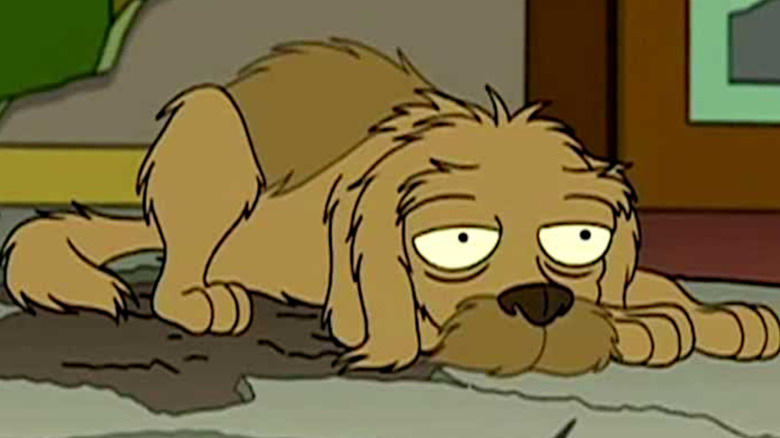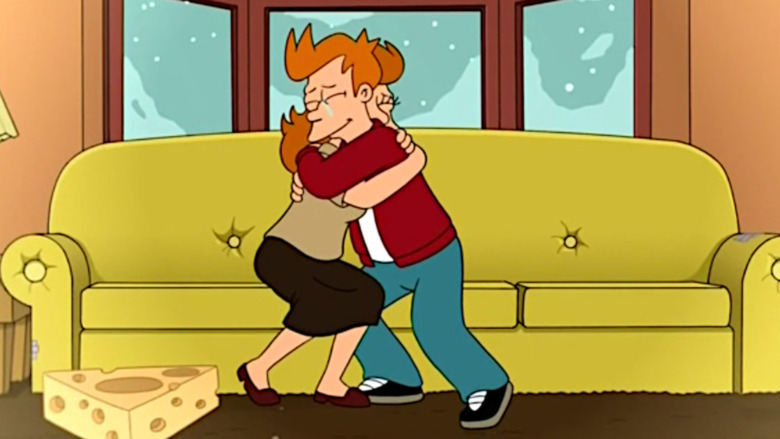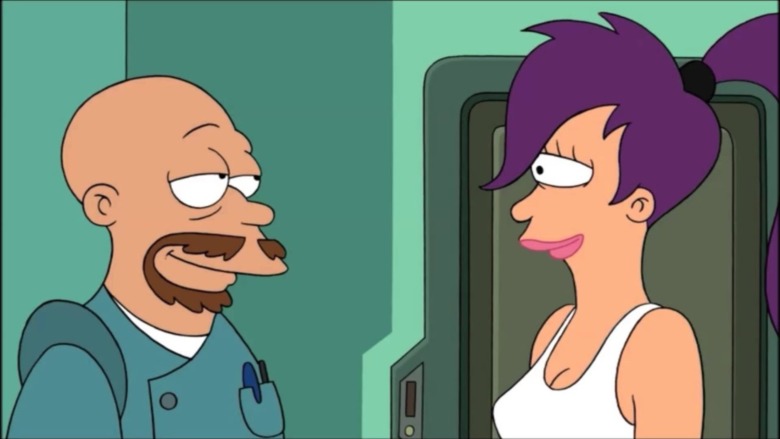How Futurama's Jurassic Bark Episode Could Have Been Sadder
Futurama, Matt Groening's 1999 follow-up to The Simpsons, takes a hapless pizza delivery boy named Philip J. Fry (Billy West) and transports him one thousand years into the future to a time where robots drink beer, aliens live among us, and space travel is commonplace — and they have him become a delivery boy all over again.
If you've ever seen Futurama, you know that, for a cartoon full of crustacean doctors, evil robot moms, and manwiches, it has this propensity to be extremely sad. There are episodes like "The Luck of the Fryrish" that take Fry's rivalry with his brother Yancy and transform it into a story about brotherly love that's so deep that it can reach out a thousand years into the future and break your heart. There's "Parasites Lost" in which, after years of unrequited feelings, Leela (Katey Sagal) finally falls in love with Fry but only because he's infested with brain worms — it sounds funny, but it's actually tremendously tragic.
However, there is one episode that is so depressing that it has become one of those episodes of television people talk about whenever sad TV is brought up — "Jurassic Bark." And believe it or not, what is likely the saddest episode in Futurama history was nearly even more tragic than it already is.
The family member that nearly waited instead of Seymour
There have been many references and flashbacks to Fry's past over the seasons, but "Jurassic Bark" is the first time we find out Fry had a beloved dog named Seymour.
Fry discovers that the fossilized remains of Seymour are in a museum and Professor Farnsworth reveals that it may be possible to clone Seymour for Fry, even restoring the dog's memories. However, when Fry finds out that Seymour lived an additional 12 years after he was cryogenically frozen, he decides it would be cruel to bring the dog into a future where whatever new family and friends he made along the way would be long dead.
And that's when the rug gets pulled out on the audience. "Jurassic Bark" ends on a flashback sequence revealing that Seymour never stopped waiting for Fry. And as "I Will Wait for You" from the musical The Umbrellas of Cherbourg plays, Seymour waits in the same spot for 12 years until, finally, he closes his eyes for the last time and dies. It is emotionally gutting in a way that maybe no other ending of a television show has ever been.
So how could the story have been arguably even more tragic? As explained by series co-creator David X. Cohen on the DVD commentary for "Jurassic Bark," the original fossil discovered was not of Seymour, but of Fry's mother Sherri (Tress MacNeille). "The Luck of the Fryrish" and other flashback episodes reveal the complex relationship Fry has with his brother and father. And while he loves his mother, she is typically portrayed as focusing more on sports than on her kids. So, imagine how cruel it would have been if Fry had decided not to clone his mother for fear that she would not want to live in the future — only for the audience to discover that she had waited every day for her son to return and died still waiting.
Fry's family and the stories influenced by Jurassic Bark
According to David X. Cohen, the reason Futurama writers decided on Seymour rather than Sherri Fry was that they felt the story told with Sherri waiting forever would be too sad. At one point, there was also a consideration that Fry's father, Yancy Sr. (John DiMaggio), might be the one fossilized, but the same conclusion was reached. What's interesting about this isn't that Seymour was used instead, but that, eventually, there were episodes that did deal with Fry's relationship with his parents.
In the episode "Game of Tones" Fry is given a chance to visit his mother through dreams. And while most of the dreams are his own, the final dream is one where he is sent into the past and into the consciousness of his mother so he can tell her that he loves and misses her.
Similarly, in the episode "Cold Warriors," we find out through a series of flashbacks that although Yancy Sr. is always hard on his son Philip, he is only mean to him in order to make the boy stronger. While Yancy Sr. couldn't have known his son would wind up living 1,000 years in the future, in some small way, his decision to provide tough love can be seen as part of why Fry is able to adapt to life in the future.
Looking at the whole series, even Seymour's story doesn't remain as sad as it was in "Jurassic Bark." In the story "Bender's Big Score," an alternate universe version of Fry goes back in time to when the original Fry was first frozen and lives for many years with his family, including Seymour. The Fry double (who changes his name to Lars) actually spends lots of time with Seymour and we even see them riding a bike together.
Ultimately, "Jurassic Bark" took the best shape it probably could have taken, but it's interesting to hear what the original plan was and consider how those ideas helped shape later Futurama stories.


